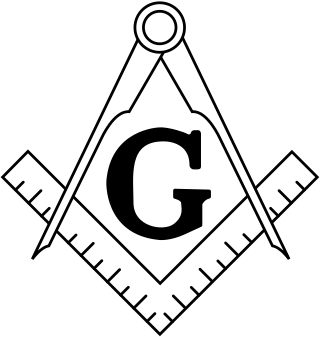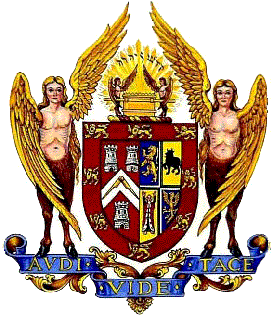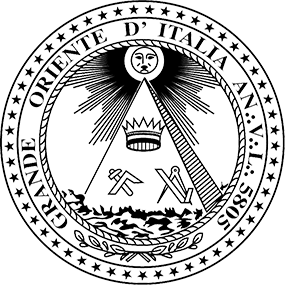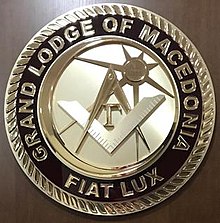
Freemasonry or Masonry refers to fraternal organisations that trace their origins to the local guilds of stonemasons that, from the end of the 13th century, regulated the qualifications of stonemasons and their interaction with authorities and clients. Modern Freemasonry broadly consists of two main recognition groups: Regular Freemasonry, which insists that a volume of scripture be open in a working lodge, that every member professes belief in a Supreme Being, that no women be admitted, and that the discussion of religion and politics do not take place within the lodge; and Continental Freemasonry, which consists of the jurisdictions that have removed some, or all, of these restrictions.

A Masonic lodge, often termed a private lodge or constituent lodge, is the basic organisational unit of Freemasonry. It is also commonly used as a term for a building in which such a unit meets. Every new lodge must be warranted or chartered by a Grand Lodge, but is subject to its direction only in enforcing the published constitution of the jurisdiction. By exception the three surviving lodges that formed the world's first known grand lodge in London have the unique privilege to operate as time immemorial, i.e., without such warrant; only one other lodge operates without a warrant – the Grand Stewards' Lodge in London, although it is not also entitled to the "time immemorial" title. A Freemason is generally entitled to visit any lodge in any jurisdiction in amity with his own. In some jurisdictions this privilege is restricted to Master Masons. He is first usually required to check, and certify, the regularity of the relationship of the Lodge – and be able to satisfy that Lodge of his regularity of membership. Freemasons gather together as a Lodge to work the three basic Degrees of Entered Apprentice, Fellowcraft, and Master Mason.

In Freemasonry, regularity is one of the factors by which individual Grand Lodges judge whether to recognise one another for the purposes of allowing formal interaction at the Grand Lodge level and visitation by members of other jurisdictions. Each individual Grand Lodge determines which other Grand Lodges it considers Regular.

The United Grand Lodge of England (UGLE) is the governing Masonic lodge for the majority of freemasons in England, Wales and the Commonwealth of Nations. Claiming descent from the Masonic grand lodge formed 24 June 1717 at the Goose & Gridiron Tavern in London, it is considered to be the oldest Masonic Grand Lodge in the world, together with the Grand Lodge of Scotland, and the Grand Lodge of Ireland.

Prince Hall Freemasonry is a branch of North American Freemasonry for African Americans founded by Prince Hall on September 29, 1784. There are two main branches of Prince Hall Freemasonry: the independent State Prince Hall Grand Lodges, most of which are recognized by Mainstream grand lodges, and those under the jurisdiction of the National Grand Lodge. Prince Hall Freemasonry is the oldest and largest predominantly African-American fraternity in the nation.

Freemasonry in Malta has a lengthy history dating from the eighteenth century. The main masonic influences have been from the United Grand Lodge of England, the Grand Lodge of Scotland, and the Grand Lodge of Ireland. Today Regular Freemasonry is under the jurisdiction of the Sovereign Grand Lodge of Malta, formed in 2004.
A Grand Lodge is the overarching governing body of a fraternal or other similarly organized group in a given area, usually a city, state, or country.

The Grande Loge Nationale Française (GLNF) is a French Masonic Grand Lodge. It was founded in 1913, by two lodges, "Le Centre des Amis" Lodge splitting from Grand Orient de France and "L'Anglaise" lodge, an independent lodge based in Bordeaux. GLNF is based on monotheism and the 1929 precepts of regularity issued by the United Grand Lodge of England.

The Grand Orient of Italy (GOI) is an Italian masonic grand lodge founded in 1805; the viceroy Eugene of Beauharnais was instrumental in its establishment. It was based at the Palazzo Giustiniani, Rome, Italy from 1901 until 1985 and is now located at the Villa del Vascello. Its current Grand Master is Italian journalist Stefano Bisi.

This is a general survey on the historical and modern presence of Freemasonry in countries located in Asia.

Masonic ritual is the scripted words and actions that are spoken or performed during the degree work in a Masonic lodge. Masonic symbolism is that which is used to illustrate the principles which Freemasonry espouses. Masonic ritual has appeared in a number of contexts within literature including in "The Man Who Would Be King", by Rudyard Kipling, and War and Peace, by Leo Tolstoy.

The first known Freemasons in Portugal were the Swiss John Coustos and two other Portuguese members of his lodge, who were arrested by the Portuguese Inquisition and questioned under torture in the 1740s. Coustos wrote a book detailing his sufferings under the Inquisition and pointed to 1728 as being the year of the first Lodge, although nothing is known of the first years of this Lodge and it was not then recognised by the Grand Lodge of England. Today there are several Masonic Obediences in Portugal.

Freemasonry in Barbados is one of the oldest established organisations in the country. Regular Freemasonry is controlled from London and Edinburgh by the United Grand Lodge of England (UGLE) and the Grand Lodge of Scotland through local Provincial Grand Lodges. More recently Prince Hall Freemasonry has also been established on the island.

The Grand Lodge of British Freemasonry in Germany is a Masonic Grand Lodge in Germany working in the English language and following English Masonic traditions. It was founded as a District Lodge in 1957 and after various transformations was eventually recognised as Grand Lodge in 1980. This Grand Lodge is one of the five United Grand Lodges of Germany (VGLvD). It currently has members from a variety of nations and in addition to the "resident members" in Germany, there are "non-resident members" all over the world. Currently, 18 lodges work under the GL BFG, mainly in North Rhine-Westphalia, but also in Lower Saxony, Hamburg, Munich, Berlin and also near Frankfurt.

The Red Cross of Constantine, or more formally the Masonic and Military Order of the Red Cross of Constantine and the Appendant Orders of the Holy Sepulchre and of St John the Evangelist, is a Christian fraternal order of Freemasonry. Candidates for the order must already be members of Craft Freemasonry (lodge) and Royal Arch Freemasonry (chapter); they must also be members of the Christian religion, and proclaim their belief in the Christian doctrine of the Holy Trinity.

Anglo-American Freemasonry is a loose network of overlapping chains of mutually recognized Grand Lodges, forming a Regular Masonic jurisdiction. For the most part these trace their descent from one of "original" British Grand Lodges, with mutual recognition based on adherence to certain core values, rules and membership requirements.

The Grand Lodge of Cyprus, or in the Greek language, Μεγάλη Στοά της Κύπρου, is the sovereign governing body of freemasonry within the Republic of Cyprus. Its formal English name is "The Most Worshipful Grand Lodge of Cyprus, Ancient Free and Accepted Masons." While four of its constituent lodges are approaching 100 years of age, the Grand Lodge of Cyprus itself came into being on February 15, 2006. Thus it is one of the youngest grand lodges in the world.

The Grand Lodge of Russia (GLoR) is the Regular Masonic jurisdiction for Russia. The Grand Lodge was established on 24 June 1995. It was the first national grand lodge to be created in the country since the closure of the original Russian grand lodges in 1917, when Freemasonry was banned by the Bolsheviks in the wake of the October Revolution.

The history of Freemasonry in Ghana can be traced to the early nineteenth century when the first Masonic lodge was consecrated in the country. The practice of Freemasonry was imported to the then Gold Coast and other Commonwealth realms by European residents in the nation during the British colonial era. Most of the lodges in Ghana are governed by the United Grand Lodge of England (UGLE) and Wales, Grand Lodge of Scotland and the Grand Lodge of Ireland. Similar to their sister organisations worldwide, Ghanaian masonic fraternities are nonsectarian, with proceedings of the societies being strictly apolitical and non–religious.

Palatine Lodge No. 97 is a Craft Masonic Lodge in Freemasonry under the jurisdiction of the United Grand Lodge of England. The Lodge meets at Wearside Masonic Temple, Burdon Road, Sunderland and has done so since 1932. Previously the Lodge met at the Masonic Hall in Park Terrace, which was dismantled in 1988, rebuilt and opened in April 2000 at the Beamish Open Air Museum, Stanley, County Durham, England.












